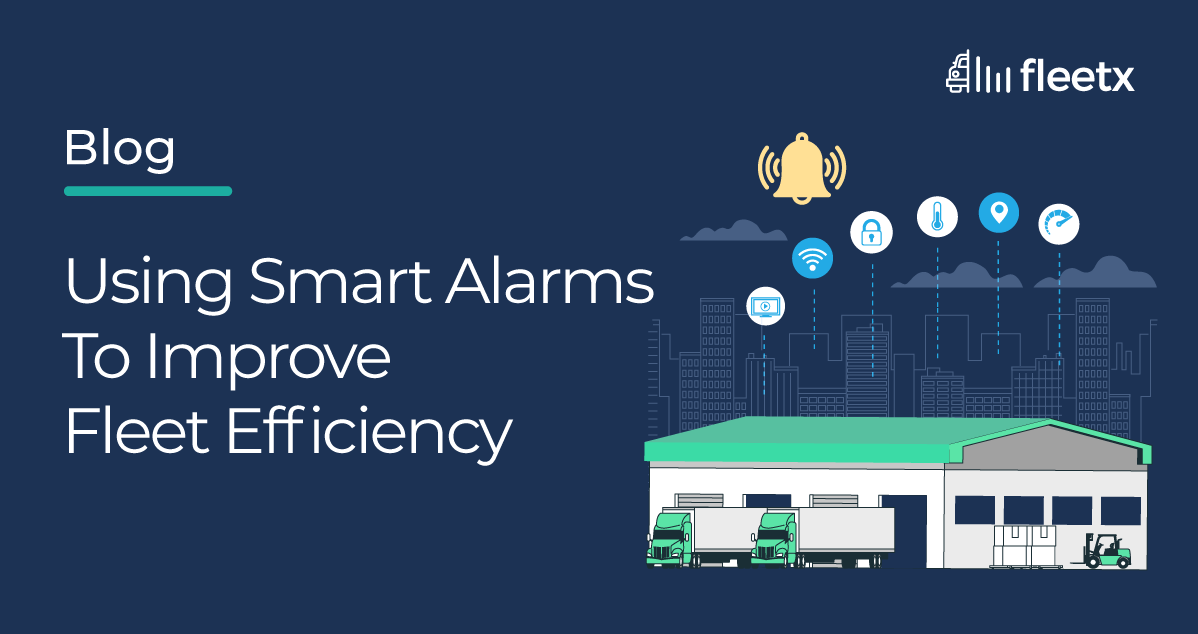
In the current logistical landscape, where every second and every kilometer count, the need for smarter solutions has never been more pressing. Fleet managers and owners face an array of challenges daily, from optimizing routes and fuel consumption to ensuring the safety of their drivers and vehicles. These challenges are now being addressed thanks to the constant technological innovations happening in this sector, as demand for smart solutions increase. One solution that has addressed an important aspect of fleet management, security and safety, is the smart alarm.
As a fleet manager or owner, you might already be familiar with smart alarms (if not, an explanation will follow!), but are you aware of the game-changing benefits they can bring to your operations? In this article, we'll explore how smart alarms can significantly enhance the efficiency of your fleet management, making your life easier and your business more profitable.
What is a Smart Alarm?
Smart alarms are advanced alarm systems that use innovative technology and data analytics to provide real-time alerts and notifications regarding various aspects of fleet management and logistics operations. These alarms are designed to help fleet managers, logistics companies, and vehicle operators monitor and improve the efficiency, safety, and overall performance of their operations. Here are some key features and functions of smart alarms in the logistics industry. Make sure to explore the all these functions, if available, to make the most of your smart alarm systems!
- Real-time monitoring: Continuously monitor various parameters related to vehicles, drivers, and cargo in real-time. This includes information such as vehicle location, speed, fuel levels, temperature (in the case of refrigerated transport), and more.
- Customisable alerts: Customize the alarm settings based on specific requirements and preferences. For example, set thresholds for vehicle speed, idle time, route deviations, or unauthorized stops. When these thresholds are crossed, the system triggers an alert.
- Instant notifications: When an alarm condition is met, the system sends instant notifications to designated recipients, typically via mobile apps, email, or SMS. This allows fleet managers and operators to take immediate action in response to critical events or deviations from standard operating procedures.
- Safety alerts: Smart alarms can detect and report unsafe driving behavior, such as harsh acceleration, harsh braking, sharp turns, and speeding. These alerts help improve driver safety and reduce the risk of accidents.
- Fuel Efficiency alerts: Monitoring fuel consumption and detecting abnormal fuel level changes can help identify fuel theft and inefficiencies in fuel usage. Smart alarms notify fleet managers of significant deviations in fuel levels.
- Maintenance reminders: These alarms track vehicle health and provide maintenance alerts based on engine diagnostics and predefined maintenance schedules. This proactive approach helps prevent breakdowns and reduces maintenance costs.
- Compliance Monitoring: For regulatory compliance, smart alarms can track driver hours of service, adherence to local safety regulations, and other legal requirements, ensuring that fleet operations remain within the bounds of the law.
- Geofencing: Smart alarms often include geofencing capabilities, allowing users to create virtual boundaries or zones on a map. When a vehicle enters or exits these predefined areas, alerts are generated, which can be used for monitoring deliveries, unauthorized vehicle usage, or entry/exit times at specific locations.
Need for Smart Alarms
The development of smart alarm solutions in the logistics industry emerged in response to several pressing needs and challenges faced by companies, particularly in countries like India, where logistics and transportation play a critical role in the economy. However, the lack of a standardised regulatory framework, as well as varying levels of accessibility to logistics infrastructure limit the industry’s potential.
Growing economies like India’s depend on the movement of goods, and as customer expectations increase, along with the development of communication technology, there is an increased need for transparency, and accountability. Smart alarms are tried and tested method of addressing these challenges, and have proven to facilitate the following benefits:
- Improved Operational Efficiency: Smart alarms enhance operational efficiency by providing real-time data and alerts for route optimization, fuel consumption, and maintenance needs. This enables data based decision-making and cost-effective management in logistics operations.
- Enhanced Safety: Smart alarms enhance driver and fleet safety through real-time monitoring of driver behavior, vehicle conditions, and security threats. Immediate alerts enable proactive measures to prevent accidents and mitigate risks.
- Cost Savings: Smart alarms drive cost savings by monitoring fuel efficiency, reducing maintenance expenses through timely alerts, and optimizing routes to minimize fuel consumption and wear and tear. They also enhance compliance, avoiding costly fines, and prevent theft, thereby safeguarding valuable assets.
Signing Off
In short, smart alarms are not just another piece of technology; they are a powerful tool that can revolutionize your fleet management. They provide real-time insights, enhance safety, save costs, and boost efficiency, making them an valuable asset for any fleet manager or owner looking to stay competitive in today's fast-paced industry. The return on investment in smart alarms is sure to pay off (several times!) in the future.
If you are considering integrating smart alarms into your fleet management strategy, we invite you to explore our comprehensive suite of smart solutions at Fleetx!






